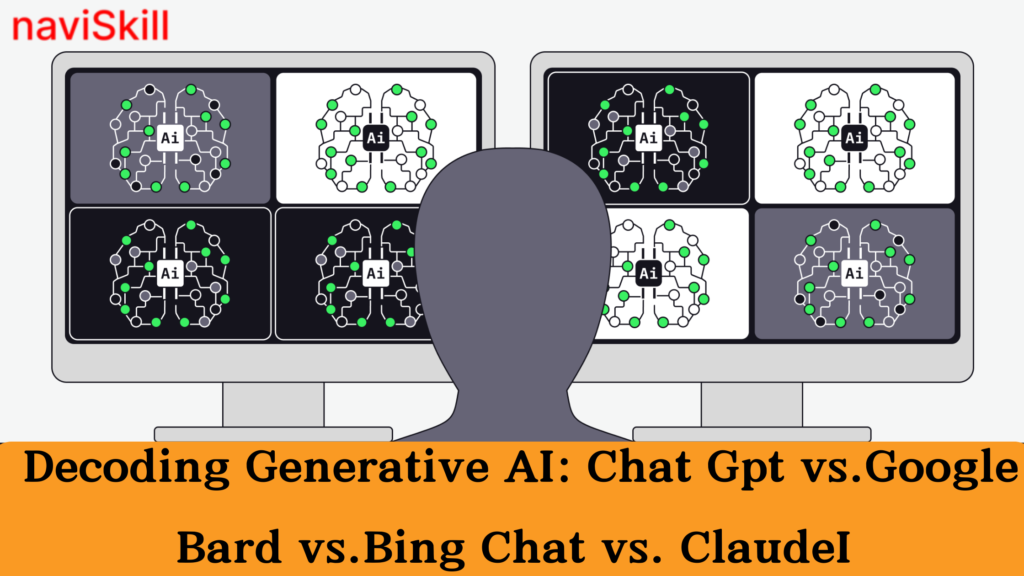INTRODUCTION:
In the field of generative AI, where computers bring language to life, four strong challengers have emerged: Chat Gpt, Google Bard, Bing Chat, and Claude. Each of these artificial intelligence systems is intended to generate human-like prose, respond to queries, and engage in interactive discussions. In this blog, we’ll look at their features, strengths, and potential areas for improvement to help you decide which generative AI solution is ideal for your needs.
- Chat GPT: The Leading Powerhouse.
Chat gpt, developed by OpenAI, is considered an innovator in generative AI. ChatGPT is powered by the GPT-3.5 architecture and has extraordinary adaptability. It excels in comprehending context, providing thorough responses, and even injecting a touch of creativity into its output.Its substantial training data enables it to understand complicated inquiries and provide coherent, contextually relevant responses. However, certain instances of excessive detail and misuse of specific terms may be noted.
- Google Bard: The Search Giant’s Entry into AI Conversation
Google Bard, Google’s generative AI project, uses advanced language models to understand and respond to human inputs. With Google’s vast resources, Bard is skilled at collecting information from the web and providing short and factual responses. However, it may occasionally struggle with context, producing responses that are factually correct but lack conversational flow. Bard’s strength comes in its information retrieval capabilities, which make it a go-to for knowledge-based questions.
- Bing Chat: Microsoft’s Conversational Artist.
Bing Chat, Microsoft’s entry into the generative AI space, stands out for its ability to participate in natural and context-aware conversations. Built on Microsoft’s powerful AI platform, Bing Chat excels at sustaining coherent dialogue and understanding user intent. Its connection with Microsoft’s ecosystem provides easy access to productivity tools, making it a viable option for customers who are strongly invested in the Microsoft environment. However, it may sometimes deliver fewer detailed responses than ChatGPT.
- Claude: the Understated Contender.
Claude, a relative newcomer, lends a certain beauty to the generative AI scene. Claude, developed by an independent team, is simple and easy to use. It may not have as much training data as its larger equivalents, but it compensates with a clean and straightforward interface.
Claude is excellent to users who want a fast and dependable conversational AI without the need for considerable customisation. However, its capabilities may be seen as less sophisticated when compared to those of ChatGPT.
Choosing the Right Fit For You:
Complexity versus Simplicity:
ChatGPT is your go-to for complicated and nuanced responses.
Claude may be more intriguing if you prefer a basic interface and uncomplicated interactions.
Knowledge Retrieval:
Google Bard is very effective at extracting information rapidly.
Bing Chat, with its context-aware features, strikes a balance between information and interaction.
Ecosystem Integration:
If you’re already invested in the Microsoft ecosystem, Bing Chat provides seamless connectivity.
Google Bard is well-suited to those who are already familiar with the Google environment.
Innovation and experimentation:
ChatGPT, which is being developed by OpenAI, is expected to gain regular updates and improvements.
Claude, while simpler, may appeal to those looking for a trustworthy, no-frills conversational experience.
In conclusion ,the decision between ChatGPT, Google Bard, Bing Chat, and Claude is ultimately based on your individual requirements and preferences. Whether you value intelligent responses, quick information retrieval, ecosystem integration, or simplicity, each generative AI solution offers distinct advantages. As artificial intelligence improves, these platforms will undoubtedly be refined, offering consumers with increasingly advanced and personalized conversational experiences.


